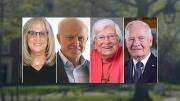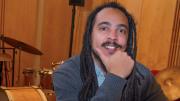A Physicist for SEAS

Cherry A. Murray has been appointed dean of the School of Engineering and Applied Sciences, effective July 1. After earning her undergraduate and doctoral degrees at MIT, Murray worked at Bell Laboratories from 1978 until 2004, rising to become senior vice president for physical sciences and wireless research. She has since been principal associate director for science and technology at Lawrence Livermore National Laboratory. Thus, she combines industry and public-sector experience with her own scientific investigations involving light scattering, soft condensed matter, and complex fluids. She is a member of the National Academy of Sciences, the American Academy of Arts and Sciences, and the National Academy of Engineering, and is current president of the American Physical Society. Murray succeeds Venkatesh Narayanamurti, who stepped down last September, after a decade as dean; citing their previous work together at Bell Labs, he hailed her as “a proven leader.” This academic year, Franklin professor of applied physics Frans Spaepen has served as SEAS’s interim dean.

Roy Kaltschmidt/LBNL
Steven Chu
Chu for Commencement
A year that began with Al Gore ’69, LL.D. ’94, focusing campus attention on global warming and energy conservation (see “Gore Boosts a Greener Harvard,” January-February, page 58), will close on a similar note. Nobel laureate Steven Chu, who shared the physics prize in 1997 for fundamental work in using laser light to cool and “trap atoms,” and is now U.S. Secretary of Energy, will be the principal Commencement afternoon speaker on June 4. In his new role, Chu is the Obama administration’s point person for alternative and renewable energy policy, as part of a broader agenda on climate change.
Stem-cell Studies
The Faculty of Arts and Sciences (FAS) has approved a ninth undergraduate life-sciences concentration, in human developmental and regenerative biology. The field, opening to students next fall, aims to explore how human beings develop from fertilized eggs through adulthood and aging, and draws on the FAS-Harvard Medical School faculty who collaborate through the department of stem cell and regenerative biology (www.scrb.harvard.edu, where there is a link describing undergraduate study). The department is co-chaired by Jordan professor of medicine David Scadden and Cabot professor of the natural sciences Douglas Melton. The latter introduced the legislation for the new concentration at a March 10 faculty meeting, and will serve as co-head tutor with Kevin Eggan, assistant professor of stem cell and regenerative biology.

Ashton B. Carter

Phil Farnsworth
Jody Freeman
Potomac Professors
Joining the faculty members whose appointments were previously announced (see Brevia, March-April, page 51) are these additional policymakers in the Obama administration: Ford Foundation professor of science and international affairs Ashton B. Carter, who will serve as under secretary of defense for acquisition, technology, and logistics—the Pentagon’s chief weapons buyer; Eckstein professor of applied economics David M. Cutler, a healthcare adviser (see the review of his book, Your Money or Your Life: Strong Medicine for the American Health Care System, September-October 2004, page 23); professor of law Jody Freeman, counselor for energy and climate change;

George Simian
Daniel Meltzer
Story professor of law Daniel Meltzer, principal deputy counsel to the president; Lindh professor of practice of global leadership and public policy Samantha Power, at the National Security Council; Safra professor of economics Jeremy Stein, working on the National Economic Council; Fineberg professor of the practice of public health Howard Koh, as assistant secretary for health; and Thier professor of medicine David Blumenthal to coordinate computerized medical records.
Nota Bene
Stress test. Perhaps sensing the tenor of the times, Harvard Health Publications has created an online Stress Resource Center at www.health.harvard.edu/stress. It offers advice on and markets publications concerning the damaging effects of stress on health.
Tuition tab. Harvard College’s bill for tuition, room, board, and fees for the 2009-2010 academic year will rise 3.5 percent, to $48,868. Tuition income is one of the Faculty of Arts and Sciences’ principal sources of unrestricted revenue—more valuable than ever, given the pressure on the endowment, in part because need-based scholarship aid is expected to increase by 18 percent, to $147 million, in the coming year. Harvard’s increase is in the middle of those announced by peer institutions. Princeton’s 2.9 percent increase appears to be the smallest price hike.

Lynne Davis
John Ashbery
Arts honorand. Poet John Ashbery ’49—who won the Pulitzer Prize, the National Book Award, and the National Book Critics Circle Award in 1979 for Self-Portrait in a Convex Mirror—was scheduled to receive the Harvard Arts Medal on April 30, beginning the annual Arts First celebration.
Atmosphere in the blogosphere. Pratt professor of business and government Robert N. Stavins, who directs the Harvard Environmental Economics Program and chairs the Environment and Natural Resources Faculty Group, is now blogging. See “An Economic View of the Environment” at https://belfercenter.ksg.harvard.edu/analysis/stavins.

Kris Snibbe/Harvard News Office
Howard Georgi
Hail, fellow! Mallinckrodt professor of physics Howard Georgi, master of Leverett House, has been elected a fellow of the Association for Women in Science—an honor first conferred in 1996 on people who have “demonstrated exemplary commitment to the achievement of equity for women in science, technology, engineering, and mathematics.” Among the 142 fellows recognized to date are Baird professor of science emeritus Dudley Herschbach, a Nobel laureate, and Harvard College dean Evelynn Hammonds. In a note about receiving the award, Georgi wrote, “I started from such depths of cluelessness and misunderstanding” about the “special problems that women in science face every day.” He thanked women colleagues on the faculty, graduate students, and “many, MANY undergraduate women, without whose help I would be even more clueless than I am today.”
Philanthropic notes. Harvard Law School has received an anonymous $10-million gift honoring Loeb University Professor Laurence H. Tribe (see the review of his latest book on constitutional law, March-April, page 18). It will fund a new Tribe professorship of constitutional law upon his retirement; until then, at his request, it will be named in honor of the late Thurgood Marshall, associate justice of the Supreme Court. Separately, software entrepreneur Phillip Terrence Ragon and Susan M. Ragon have pledged $10 million annually for a decade to establish an AIDS vaccine research institute at Massachusetts General Hospital, in collaboration with Harvard and MIT; it will be led by professor of medicine Bruce Walker.

Massachusetts General Hospital
Konrad Hochedlinger

Maria Nemchuk
Bradley E. Bernstein

Graham Ramsay
Rachel I. Wilson
Ascending scientists. Five of 50 recipients nationwide of the Howard Hughes Medical Institute’s “early-career scientist” awards are Harvard-affiliated faculty members. Three are junior faculty members in the department of stem cell and regenerative biology: Kevin Eggan, assistant professor of stem cell and regenerative biology; Konrad Hochedlinger, assistant professor of medicine; and Amy J. Wagers, assistant professor of pathology. They are joined by Bradley E. Bernstein, assistant professor of pathology, and Rachel I. Wilson, assistant professor of neurobiology. The six-year awards provide salary, benefits, laboratory and equipment expenses, and $1.5 million in research funding, and are intended to free the scientists to pursue their most promising ideas at a critical phase in their careers.

Christine Pulliam/CFA
David Charbonneau
Miscellany. Cabot associate professor of astronomy David Charbonneau has received the 2009 Waterman Award, which recognizes an outstanding young researcher in a scientific or engineering field supported by the National Science Foundation. The award comes with a $500,000 grant to underwrite three years of research. (For coverage of his work in discovering remote “exoplanets,” see Harvard Portrait, March-April 2008, page 57.)…Two cancer researchers have been lured to senior positions elsewhere, as research into the complex spectrum of diseases intensifies. Professor of medicine D. Gary Gilliland, a Howard Hughes Medical Institute investigator who focuses on leukemia, becomes a senior vice president at Merck Research Laboratories, directing oncology. And professor of medicine Thomas J. Lynch Jr., a lung-cancer specialist, has been named director of Yale Cancer Center and physician-in-chief of the new Smilow Cancer Hospital at Yale-New Haven, which opens this fall.…Joseph professor of engineering and applied mathematics Howard Stone (see Harvard Portrait, November-December 1996, page 63) has been elected to the National Academy of Engineering; he redeploys to Princeton at the end of the academic year.…Harvard Law School and Harvard University Press have launched the Journal of Legal Analysis (https://jla.hup.harvard.edu), their first foray into online, open-access publishing. It is faculty edited and peer reviewed.… The New-York Historical Society has awarded its annual American history book club prize to President Drew Faust, for her acclaimed work, This Republic of Suffering: Death and the American Civil War (excerpted in the January-February 2008 Harvard Magazine, page 44). The award comes with $50,000 and recognition as the “American Historian Laureate.”…Radcliffe Institute dean Barbara J. Grosz, Higgins professor of natural sciences, has received the Allen Newell Award from the Association for Computing Machinery/Association for the Advancement of Artificial Intelligence, recognizing her career contributions in computer science.








